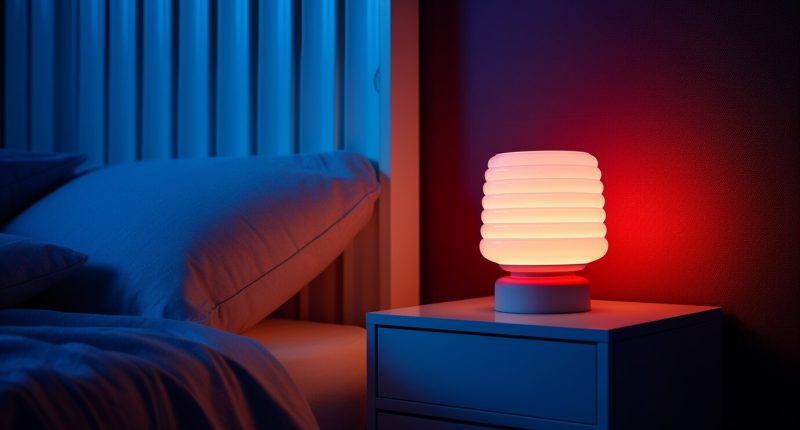Share this @internewscast.com
Red Light Therapy for Insomnia: Johanne had always been a light sleeper, but when her insomnia worsened, nights turned into a struggle. She would remain awake for hours with her mind racing, yearning for a restful slumber. Like many, she tried everything—strict bedtime routines, soothing herbal teas, and even prescription sleep aids. However, nothing seemed to bring her the deeply restorative sleep she so desperately needed. That was until she discovered red light therapy—a remedy that would transform her nights and her life.

When Sleep Hygiene Isn’t Enough
Sleep experts often suggest optimizing sleep hygiene as the initial step towards better rest. Johanne adhered to every guideline: she maintained a regular bedtime, kept her room cool and dark, avoided screens before bed, and even purchased blackout curtains and a white noise machine. These practices are known to promote healthy sleep and can significantly help many people. However, they sometimes fall short for those who suffer from chronic insomnia. For Johanne, these measures resulted in only minimal improvement, leaving her frustrated and still tired each morning.
The Limits of Sleep Medications
When improving sleep hygiene proved insufficient, Johanne’s doctor prescribed a well-known sleep medication. Initially, the pills seemed to be a promising solution—they helped her fall asleep more quickly. Nonetheless, the benefits rapidly diminished. She began experiencing side effects like grogginess, headaches, and occasional memory lapses. Worse yet, her body appeared to develop a tolerance, necessitating higher doses to achieve the same effect. Like many others, Johanne realized that while sleep medications can provide temporary relief, they often fail to tackle the underlying causes of insomnia and may come with undesired risks.
Herbal Remedies: Hope and Disappointment
Determined to find a natural solution, Johanne turned to herbal remedies. She tried valerian root, chamomile tea, and even over-the-counter melatonin supplements. While some nights brought fleeting hope—a slightly easier time drifting off or fewer awakenings—these effects were inconsistent and short-lived. Scientific evidence on the effectiveness of herbal treatments for insomnia remains mixed, and for many, including Johanne, the relief is often temporary or incomplete.
Red Light Therapy: Johanne’s Turning Point
After months of restless nights and mounting frustration, Johanne stumbled upon an article about red light therapy for sleep. Initially skeptical, she was intrigued by the science: red light therapy uses wavelengths between 600–650 nanometers to positively influence the body’s circadian rhythm and boost melatonin production, the hormone essential for sleep. Unlike blue or white light, which can disrupt sleep, red light is less likely to suppress melatonin and may even help reset the body’s internal clock, especially for those with delayed sleep phase disorder.
Johanne decided to try a red light therapy device, using it for 15 minutes each evening about an hour before bed. The process was simple and non-invasive—she just sat quietly, letting the gentle red glow wash over her.

How Red Light Therapy Restored Johanne’s Sleep
Within a few weeks, Johanne noticed remarkable changes. She began falling asleep more quickly and waking up less often during the night. Her mornings felt less groggy, and her energy levels improved. The science backs up her experience: studies have shown that red light therapy can improve sleep quality, increase sleep duration, and enhance melatonin production without the side effects associated with medications. NASA’s own research into red light therapy for astronauts highlighted its ability to regulate circadian rhythms and promote restorative sleep, benefits now accessible to anyone struggling with insomnia.
Johanne’s story is not unique. Many insomnia sufferers report similar improvements when incorporating red light therapy into their nightly routine. The therapy’s non-intrusive nature and minimal risk profile make it an appealing option for those who have found little relief from traditional methods.
Also Read | How Chair Yoga Supports Safe and Effective Weight Loss, According to Experts
We offer the most up-to-date information from top experts, new research, and health agencies, but our content is not meant to be a substitute for professional guidance. When it comes to the medication you’re taking or any other health questions you have, always consult your healthcare provider directly.















